Why Governments Can’t Ban Bitcoin
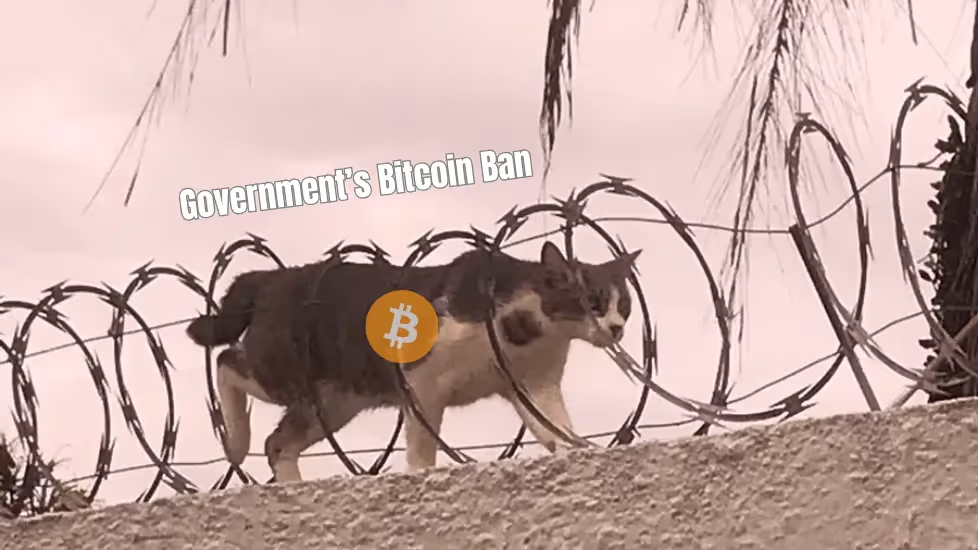
In this article:
If you ever end up in a heated debate with someone who remains adamant that Bitcoin will eventually fail, then your best course of action is to assume they have suffered a head injury and quietly move along.

But this is easier said than done. Most Bitcoiners can’t resist a good debate, and when the conversation has drifted into your area of expertise, sometimes it’s just impossible not to bite.
If you’re already well versed in orange pilling, then you’ll find it easy to bat away most of the asinine reasons people come up with for why Bitcoin is doomed, and eventually, those debating you are likely to become visibly frustrated as you calmly dismantle their poorly assembled arguments.

At this point, however, don’t be surprised if something strange happens. Sometimes, instead of just accepting defeat, you might see a smug expression creep across your adversary’s face.
That’s how you know they’re about to hit you with it. They’re about to reveal their final trump card, an argument they’re convinced will force you to stop in your tracks, rush home, and dump all your BTC. What they’re about to say next will be so profoundly retarded that the overconfidence with which it’s delivered can create a juxtaposition so powerful it opens a portal to another dimension.
We’re right at the bottom of the FUD barrel now and they’re about to drop this bombshell:
“Well it doesn’t matter anyway, because the
Government will just ban it”
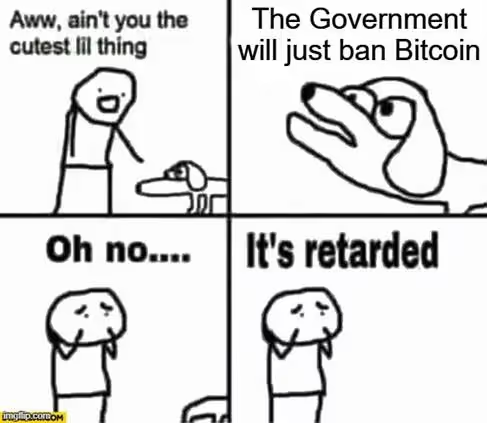
By this point you can win the debate with a simple enough question… “Which government?” But given the person you’re debating won’t immediately grasp the nuance of this retort, let’s lay out in more detail exactly why governments will never be able to ban Bitcoin, and why it’s not something that’s worth worrying about.
Bitcoin – Unbannable by Design
Governments ban lots of things, but their level of success in these endeavours varies a lot.
In some cases, bans can be quite successful at changing people’s behaviour. The smoking ban in UK pubs worked almost overnight, bans on single use plastic bags have been notably effective, and in cities where they have introduced ULEZ (Ultra Low Emission Zones), the volume of traffic drops substantially as people try to avoid the punitive charges.

Unfortunately for governments, these examples are the exception, not the norm. Government bans are largely ineffective, and in many cases even end up making the situation worse.
The war on drugs might mean you don’t see them openly on the street very often, but it doesn’t mean they aren’t readily available. Similarly, governments spent billions trying to stop peer to peer file sharing, but the last time I checked, The Pirate Bay was still operational.

One of the key differences between effective and ineffective bans is how centralised the government’s control is over the thing they are seeking to outlaw. Banning smoking in pubs? Easy because each establishment is easy to identify and levy fines upon. Policing use of the roads? Easy because it’s government owned infrastructure.
But in arenas where governments have little centralised control, their ability to enforce bans falls dramatically. They failed to ban file sharing because there was no centralised piece of infrastructure that they could exert control over, and they can never totally quash the drugs trade because criminal networks are malleable and complex.

Like file sharing, Bitcoin is impossible for governments to ban effectively because it has no single point of failure that can be co-opted or shut down by the government.
Bitcoin’s blockchain is a distributed ledger replicated across thousands of nodes running in over 150 countries worldwide, each of them independently validating and broadcasting transactions and ensuring consensus across the network.
For governments to ban Bitcoin they would need to shut down every node simultaneously, and even then, there’s nothing stopping someone spinning up a new node on some inexpensive hardware the very next day. They would be playing endless digital whack a mole.

Unlike in the centralised banking sector, it’s also impossible for governments to freeze your funds or prevent you from making transactions either. If you transmit a valid Bitcoin transaction, then nodes will propagate it, and miners will process it. With no central entity responsible for gatekeeping transactions, there is no viable point of weakness for the state to try and exert control over.
When you want to kill a snake, you chop off its head. But that becomes extremely challenging when it isn’t clear which head to chop off.
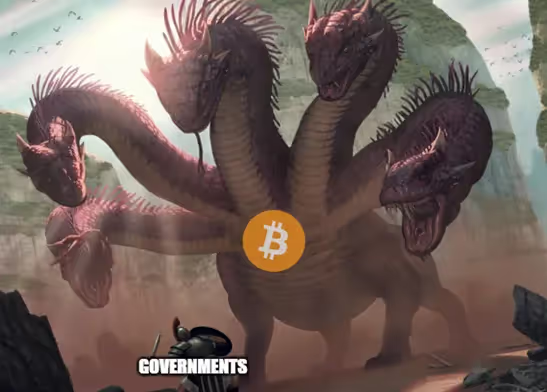
Bitcoin’s protocol is open source code, freely available for anyone to download and execute. Governments cannot outlaw software any more than they can prohibit mathematical equations; the code persists in the public domain, replicable and modifiable by anyone with basic technical knowledge.
You Can’t Ban a Global Protocol
Bitcoin is a global protocol that operates without regard for national boundaries. It allows value to flow seamlessly between jurisdictions and if you can memorise just 12 words, you can move wealth across borders with zero friction.

Achieving a global ban would require unprecedented international coordination among over 190 sovereign nations, each with divergent interests. If one country alone decides to impose a ban or overbearing restrictions on the use of Bitcoin, then this would simply redirect activity elsewhere, often to countries with more welcoming policies.
We have already seen clear examples of this. When China cracked down on Bitcoin mining in 2021, banning operations that contributed to over 50% of the global hash rate, miners didn’t vanish, they simply migrated. Equipment was promptly shipped to the United States, Kazakhstan, and other locations, and a temporary 50% drop in hash rate was swiftly followed by a full recovery and a surge to new highs.
When a superpower like China enforces a ban that barely causes Bitcoin to skip a beat, it demonstrates how resilient it is to the whims of national governments.
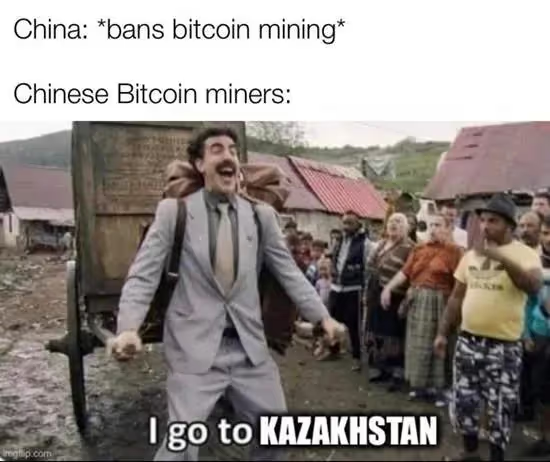
Governments are incapable of cooperating with each other in good faith even when claiming to be allies. The idea that hundreds of governments worldwide could agree on, coordinate, and even attempt a global ban on Bitcoin is comically implausible.
Bitcoin Bans are Unenforceable
Even if a government did decide to attempt some kind of enforcement or restriction upon the use of Bitcoin, the practicalities of doing so would be incredibly onerous.
Monitoring Bitcoin requires constant surveillance of billions of potential users and devices. Some activity does pass through intermediaries that require KYC, but knowing exactly how that Bitcoin is used and traded after it leaves these venues is extremely challenging.

Governments can employ chain analysis software, but it’s far from perfect because it relies heavily on inconclusive heuristics. Not to mention there are plenty of privacy tools that can be employed to make it very difficult to monitor your activity if you’re willing to learn them. Any government ban would only encourage more people to learn and adopt these solutions.
In a pinch you can even exchange private keys with someone without ever broadcasting a public transaction. How exactly would the state go about keeping track of that?
The state’s ability to monitor everybody’s financial activity on Bitcoin is hugely overstated, and the methods you can employ to improve your privacy are vastly underappreciated. The state simply does not have the resources to go door to door and force people to stop running Bitcoin nodes and broadcasting uncensorable transactions.

There are already real world examples of the futility of trying to ban the use of Bitcoin. Back in February 2021, the Central Bank of Nigeria (CBN) prohibited banks from facilitating any cryptocurrency related transactions, driven by concerns of capital flight and the devaluation of the Naira.
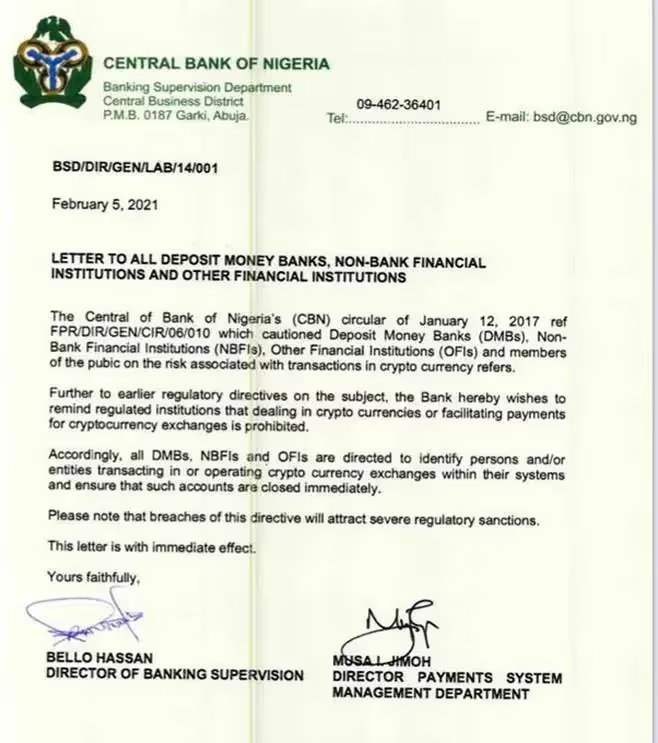
Their plan backfired. Instead of stopping Bitcoin in its tracks, it drove adoption underground. Nigerians, facing high inflation, quickly turned to peer to peer (P2P) platforms to make direct trades and started bypassing banks entirely. P2P volumes in the country surged, and Nigerians became some of Africa’s most active Bitcoin users despite the ban.
Central banks and governments are quickly coming to realise that they can’t ban Bitcoin, because the more they try to tighten their grip, the more they lose control.
Become Ungovernable – The Bitcoin Way
Governments are never going to be able to ban Bitcoin. It’s practically and economically impossible. Nobody can prevent you from running Bitcoin software and nobody can censor your transactions or take control over your money.

But this is only true if you hold your Bitcoin in full self custody.
If you make the mistake of leaving your Bitcoin with any third party institution or buy “paper Bitcoin” products like treasury stocks or ETFs instead of UTXOs, then you’re once again leaving yourself open to government interference, censorship and confiscation.
Our experts can make sure you know how to hold Bitcoin securely without involving any financial institutions that may cooperate with the government to limit your financial freedom. When you’re ready to become ungovernable, just book a free 30-minute call, and let’s get your training started today!
